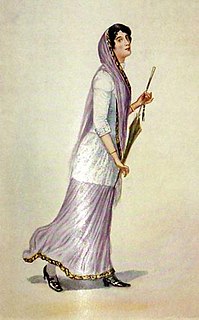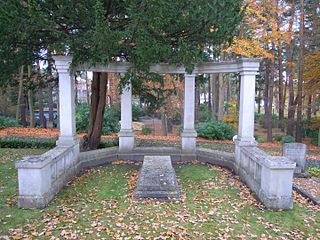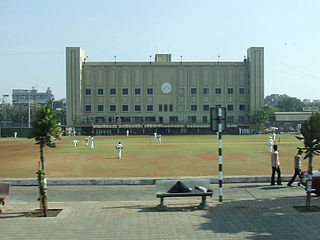Related Research Articles

Parsis or Parsees are an ethnoreligious group of the Indian subcontinent whose religion is Zoroastrianism. Their ancestors migrated to the region from Iran following the Muslim conquest of Persia in the 7th century CE. They are the first of two such to have done so, with the other being Iranis, who migrated to the subcontinent many centuries later, after the coming to power of the Qajar dynasty in Persia. According to a Zoroastrian epic, Qissa-i Sanjan, Parsis continued to migrate from the collapsed Sassanid Empire to Gujarat in between the 8th and 10th centuries CE, where they were given refuge to escape religious persecution during the early Muslim conquests.

Palwankar Baloo was an Indian cricketer and was also a political activist. In 1896, he was selected by Parmanandas Jivandas Hindu Gymkhana and played in the Bombay Quadrangular tournaments. He was employed by the Bombay Berar and Central Indian Railways, and also played for the latter’s corporate cricket team. He played in the all-Indian team led by the Maharaja of Patiala during their tour of England in 1911 where Baloo's outstanding performance was praised.

Farokh Maneksha Engineerpronunciation (help·info) is an Indian former cricketer. He played 46 Tests for India, played first-class cricket for Bombay in India from 1959 to 1975 and for Lancashire County Cricket Club in England from 1968 to 1976. Engineer was the last from his community to play for India, as not a single Parsee male has represented the country after him. He is portrayed by Boman Irani in the film 83.

Pahlan Ratanji "Polly" Umrigarpronunciation (help·info) was an Indian cricketer. He played first-class cricket for Bombay and Gujarat, and Test cricket in the Indian cricket team, mainly as a middle-order batsman but also bowling occasional medium pace and off spin. He captained the Indian team in eight Test matches from 1955 to 1958. When he retired in 1962, he had played in more Tests (59), scored more Test runs (3,631), and recorded more Test centuries (12), than any other Indian player. He scored the first double century by an Indian in Test cricket against New Zealand in Hyderabad.

George Frederick Vernon was a cricketer who played first-class cricket for Middlesex County Cricket Club. He also played one Test match for England during the first-ever Ashes tour in 1882-83.
The Bombay Quadrangular was an influential cricket tournament held in Bombay, India played between 1892–93 and 1945–46.
The Irani are an ethno-religious community in the Indian subcontinent; they descend from the Zoroastrians that emigrated from Iran to British India in the 19th and 20th centuries. They are culturally, linguistically, ethnically and socially distinct from the Parsis, who – although also Zoroastrians – emigrated to the Indian subcontinent from Greater Iran many centuries prior, starting with the Islamic conquest of Persia.
This article describes the history of cricket in India to 1918.
The Indian cricket team touring England and the British Isles in the summer of 1911 was the first all-Indian team to tour the country. The team was led by the then 19-year old Maharaja of Patiala Bhupinder Singh and had representation from the Parsees, Hindus, and the Muslims. The team had limited success winning only two amongst the 23 matches that they played on the tour.
The Parseescricket team was an Indian first-class cricket team which took part in the annual Bombay tournament. The team was founded by members of the Zoroastrian community in Bombay.
The Europeans cricket team was an Indian first-class cricket team which took part in the annual Bombay tournament. The team was founded by members of the European community in Bombay who played cricket at the Bombay Gymkhana.

Sir Nowroji Saklatwala, was an Indian businessman who was the third chairman of the Tata Group from 1932 till his sudden death in 1938.

Parmananddas Jivandas Hindu Gymkhana, known as Hindu Gymkhana is a gymkhana located along Marine Drive in Mumbai. It was originally started as Hindu Cricket Club in 1878. The gymkhana itself was inaugurated by then Governor of Bombay, Lord Harris on 5 May 1894. At that time it was located on Marine Lines, which was the only access as Marine Drive was yet to be reclaimed. Until 1942, membership of the gymkhana was restricted to people of Hindu religion. In 1942, when the government occupied the adjacent premises of the Islam Gymkhana and Parsi Gymkhana in Bombay during World War II, the gymkhana threw its membership open to Parsis and Muslims as well as an "emergency measure". Hindu Gymkhana was responsible for fielding the Hindu XI in the Bombay Quadrangular and its successor Bombay Pentangular cricket tournaments. The gymkhana is one of the founder members of the Bombay Cricket Association. Hindu Gymkhana organises several tournaments such as Purshottam Shield Cricket Tournament, which is the oldest tournament started in 1912 that it organises.
Parsi Gymkhana is a gymkhana located along Marine Drive in Mumbai. It was built for sports and social activities of Parsis. The gymkhana is one of the founder members of the Bombay Cricket Association and was the first gymkhana to be built on communal lines in Bombay. Founded by Parsi cricketers, the Gymkhana fielded the Parsi XI during the Bombay Quadrangular and its successor Bombay Pentangular cricket tournaments. Parsi Gymkhana was founded in 1884 and was opened in 1888. In 2010, Parsi Gymkhana along with other community organisations announced a project to revive interest in cricket among the community.
Mehallasha Edulji Pavri was an Indian cricketer born to a Parsi family, who played 26 first-class matches between 1892 and 1913. He was India's earliest genuine fast bowlers in its pre-Test era. He was a right-handed batsman and a right-arm fast bowler. Most of his first-class cricket was for the Parsees, but he also represented an All-India XI and Middlesex several times.
Parsi theatre is a generic term for an influential theatre tradition, staged by Parsis, and theatre companies largely-owned by the Parsi business community, which flourished between 1850 and 1930s. Plays were primarily in the Hindustani language, as well as Gujarati to an extent. After its beginning in Bombay, it soon developed into various travelling theatre companies, which toured across India, especially north and western India, popularizing proscenium-style theatre in regional languages.
Parsiana, a semi-monthly magazine in English published from Bombay, carries information on, and features of interest to the International Zoroastrian community. As of 2019, it is in its 55th year of publication.
Dr Hormasji Dorabji Kanga was an Indian cricketer who played first-class cricket for the Parsis cricket team between 1899 and 1921 as an all-rounder and opening batsman. He was the first Indian to score a double century in a first-class match, and the Kanga Cricket League is named after him. His older twin brothers Dinshaw and MD also played first-class cricket for Parsees.

Mehli Dinshaw Irani was an Indian cricketer, who played as a left-handed batsman and wicket-keeper. Irani played in the Kanga Cricket League for over 50 years. He made one appearance for Bombay in the Ranji Trophy, and also played club cricket for Bombay University and Parsee Cyclists.
The Bombay Dog Riots, also known as the 1832 Bombay Riots, were a series of protest actions that devolved into rioting in the city of Mumbai, India. The riots were sparked by an attempt by the British government to exterminate the city's stray dogs, controversial for Parsis due to dogs being considered sacred in the Zoroastrian religion. The event was the first instance of rioting in the modern history of Mumbai.